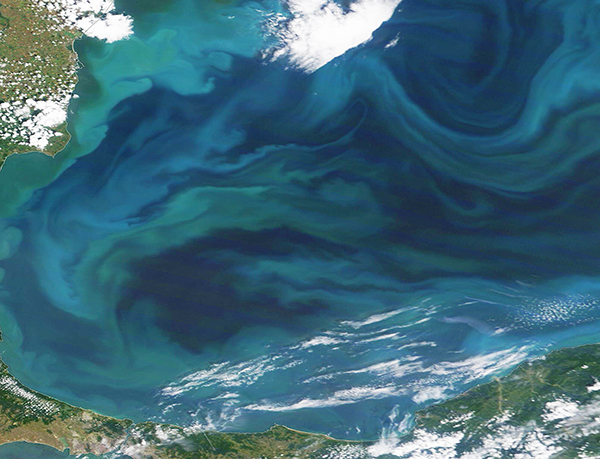Images
June 17, 2022 - Bloomin' Black Sea
Tweet
Aquatic artists painted glorious jewel-toned colors in the normally dark waters of the Black Sea in mid-June 2022. The Moderate Resolution Imaging Spectroradiometer (MODIS) on board NASA’s Terra satellite acquired a true-color image of the astounding scene on June 16. This image captures swirls ranging from deep olive, to turquoise, to milky-blue in the western end of the Black Sea, off the coasts of Romania, Bulgaria, and Turkey.
The tiny artists didn’t create the multi-hued masterpiece with brushes and paint, they created it from the pigments found within their own cellular structure. Phytoplankton are microscopic organisms that contain chlorophyll and other pigments. Some, such as coccolithophores, lend a milky tone to the colorful scene because they contain chalk-like calcium carbonate plates in their structure. These tiny organisms live in these waters year-round, but when conditions are perfect—proper temperature, sufficient nutrients, and enough sunlight—they can reproduce explosively, creating gigantic blooms that can be easily seen from space. With more than 150 species of phytoplankton identified from the waters of the Black Sea, when multiple species bloom at the same time, the result is often a stunning, multi-toned palette.
Large blooms of phytoplankton can be beneficial, because they form the base of the marine food web and provide nourishment for fish and other organisms, and because they can sequester carbon, keeping it out of the atmosphere. However, phytoplankton may also be harmful, especially when large blooms die rapidly. Decaying plants reduce oxygen out of water, creating conditions that are so oxygen-poor that they are called “dead zones”, because little life can survive under such conditions.
Image Facts
Satellite:
Terra
Date Acquired: 6/16/2022
Resolutions:
1km (248.2 KB), 500m (691.8 KB), 250m (1.9 MB)
Bands Used: 1,4,3
Image Credit:
MODIS Land Rapid Response Team, NASA GSFC
Tweet
Aquatic artists painted glorious jewel-toned colors in the normally dark waters of the Black Sea in mid-June 2022. The Moderate Resolution Imaging Spectroradiometer (MODIS) on board NASA’s Terra satellite acquired a true-color image of the astounding scene on June 16. This image captures swirls ranging from deep olive, to turquoise, to milky-blue in the western end of the Black Sea, off the coasts of Romania, Bulgaria, and Turkey.
The tiny artists didn’t create the multi-hued masterpiece with brushes and paint, they created it from the pigments found within their own cellular structure. Phytoplankton are microscopic organisms that contain chlorophyll and other pigments. Some, such as coccolithophores, lend a milky tone to the colorful scene because they contain chalk-like calcium carbonate plates in their structure. These tiny organisms live in these waters year-round, but when conditions are perfect—proper temperature, sufficient nutrients, and enough sunlight—they can reproduce explosively, creating gigantic blooms that can be easily seen from space. With more than 150 species of phytoplankton identified from the waters of the Black Sea, when multiple species bloom at the same time, the result is often a stunning, multi-toned palette.
Large blooms of phytoplankton can be beneficial, because they form the base of the marine food web and provide nourishment for fish and other organisms, and because they can sequester carbon, keeping it out of the atmosphere. However, phytoplankton may also be harmful, especially when large blooms die rapidly. Decaying plants reduce oxygen out of water, creating conditions that are so oxygen-poor that they are called “dead zones”, because little life can survive under such conditions.
Image Facts
Satellite:
Terra
Date Acquired: 6/16/2022
Resolutions:
1km (248.2 KB), 500m (691.8 KB), 250m (1.9 MB)
Bands Used: 1,4,3
Image Credit:
MODIS Land Rapid Response Team, NASA GSFC




